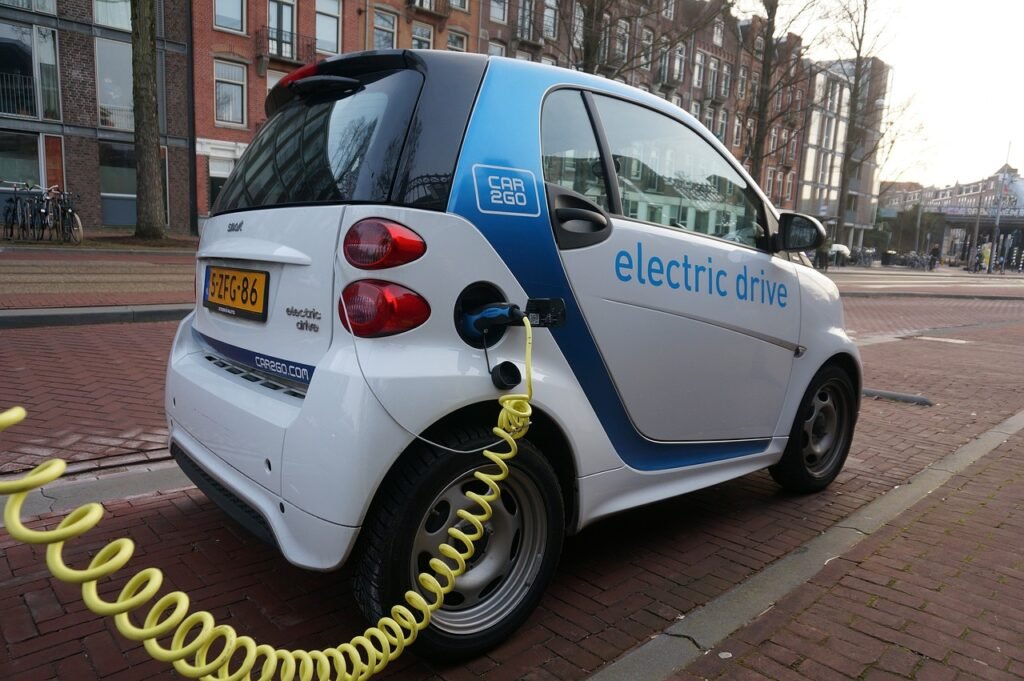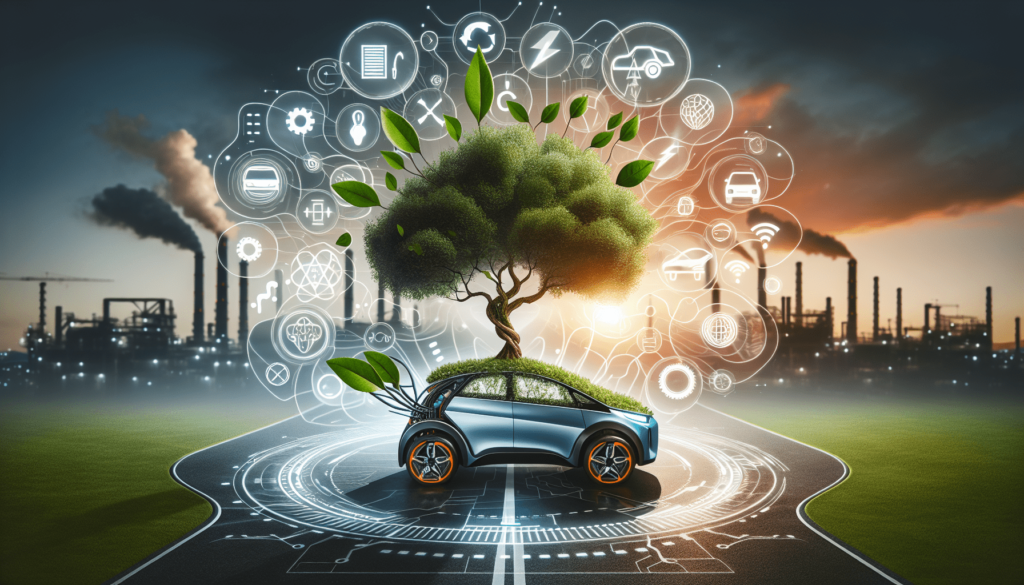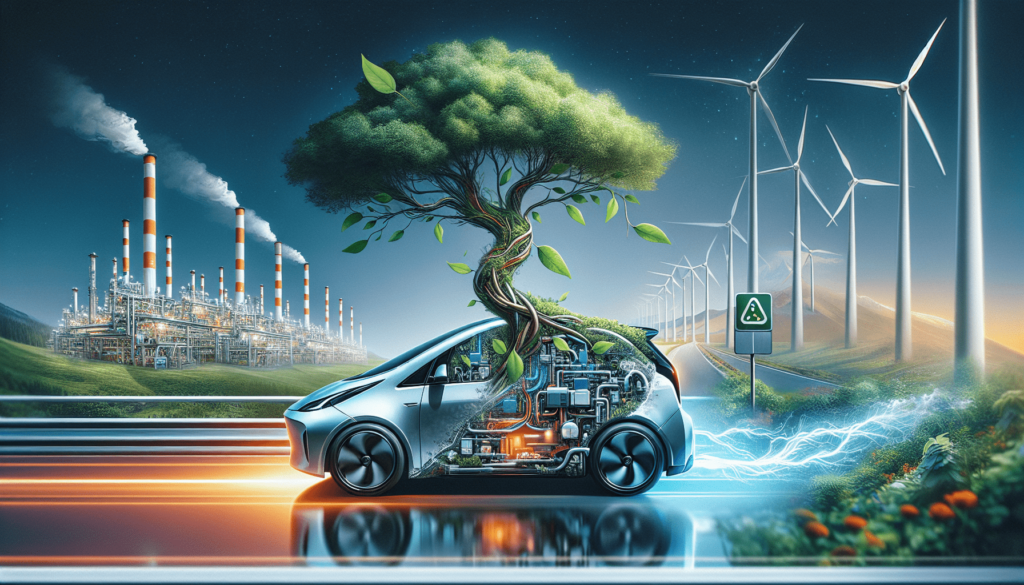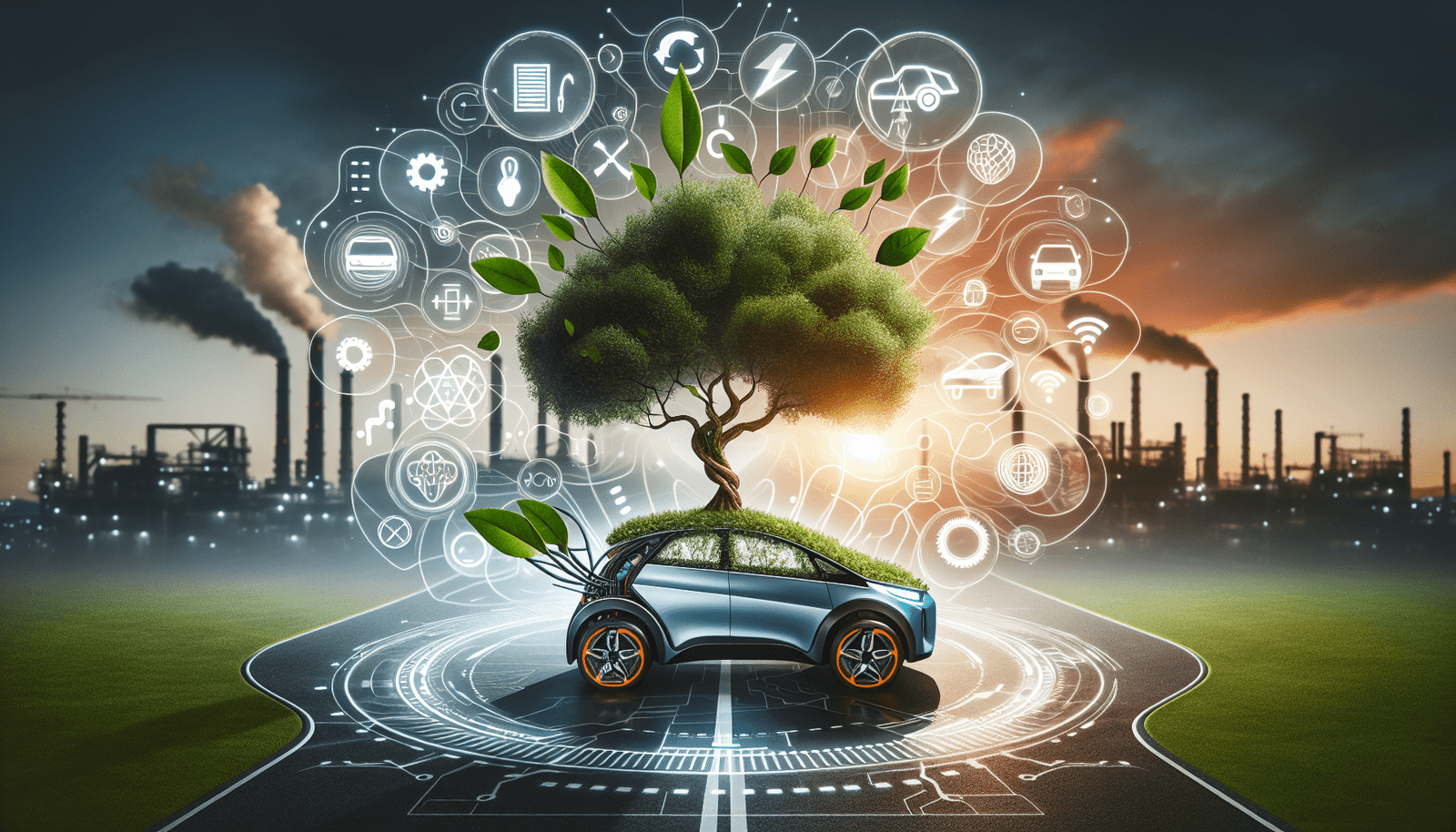In today’s ever-evolving world, the rise of electric vehicles has captured the attention of environmentally conscious individuals. With the aim of reducing carbon emissions and combating climate change, the manufacturing process of electric vehicles plays a crucial role in determining their sustainability. From the extraction of raw materials to the assembly of components, each step in the production chain can have both positive and negative implications for the environment. By exploring these impacts, we can gain a deeper understanding of the sustainability challenges and opportunities that arise in the manufacturing process of electric vehicles.
Reduced Carbon Emissions
Increase in Electric Vehicle (EV) Production
The increase in electric vehicle (EV) production has been a significant contributor to the reduction in carbon emissions. As more and more EVs are hitting the roads, the demand for traditional internal combustion engine (ICE) vehicles is decreasing. Since EVs run on electricity, they do not emit any tailpipe emissions. This shift in consumer preference towards EVs has resulted in a significant reduction in carbon emissions, as electricity generation can be sourced from renewable energy sources, such as solar or wind power.
Reduction in Greenhouse Gas Emissions
Greenhouse gas emissions, including carbon dioxide (CO2), methane (CH4), and nitrous oxide (N2O), contribute to global warming and climate change. One of the major advantages of electric vehicles is their lower greenhouse gas emissions when compared to traditional ICE vehicles. While ICE vehicles rely on fossil fuels for their operation, EVs can rely on electricity generated from renewable sources, which reduces the overall emissions associated with their use. Additionally, the reduced emissions from EVs have a positive impact on air quality and public health, leading to a cleaner and more sustainable environment.
Lower Lifecycle Emissions
In addition to the lower emissions during operation, electric vehicles also have lower lifecycle emissions compared to their ICE counterparts. The lifecycle emissions of a vehicle include the emissions associated with the manufacturing, use, and disposal of the vehicle. EVs have been found to have lower manufacturing emissions due to the use of lightweight materials and the absence of complex internal combustion engines. Furthermore, advancements in battery technology and recycling methods have also contributed to the reduction of lifecycle emissions. As the manufacturing process of EVs becomes more sustainable, the overall impact on the environment is significantly minimized.
Resource Consumption
Reduced Fuel Consumption
One of the main advantages of electric vehicles is their reduced fuel consumption compared to conventional ICE vehicles. EVs rely on electricity as their primary source of energy, which is more efficient than burning fossil fuels. This not only saves money on fuel costs but also reduces the consumption of non-renewable resources like petroleum. By transitioning to electric vehicles, you contribute to the conservation of valuable resources and minimize the environmental impact associated with resource extraction and consumption.
Conservation of Non-Renewable Resources
The manufacturing process of electric vehicles promotes the conservation of non-renewable resources. Conventional vehicles heavily rely on fossil fuels for their operation, which puts a strain on limited resources like oil and gas. In contrast, electric vehicles are powered by electricity, which can be generated from renewable energy sources. By adopting EVs, we reduce the dependence on non-renewable resources and embrace a sustainable approach towards transportation.
Raw Material Extraction Impacts
The extraction of raw materials to manufacture electric vehicles does have environmental impacts. However, compared to conventional vehicles, the overall impact is significantly lower. EVs utilize lighter materials such as aluminum and carbon fiber, which require less energy to produce and result in reduced emissions. Additionally, efforts are being made to source raw materials in a responsible and sustainable manner to minimize the negative social and environmental impacts associated with extraction. By addressing these challenges and implementing sustainable practices, the manufacturing process of electric vehicles can continue to reduce its raw material extraction impacts.
Energy Efficiency
Energy Consumption in Manufacturing
The manufacturing process of electric vehicles has made significant strides in improving energy efficiency. Efforts are being made to optimize production lines, implement energy-saving technologies, and reduce energy consumption during manufacturing. By adopting energy-efficient practices, manufacturers are not only reducing their carbon footprint but also saving costs. This focus on energy efficiency ensures that electric vehicles are not only cleaner to operate but also cleaner to produce.
Efficient Use of Energy Sources
Electric vehicles enable the efficient use of energy sources due to their reliance on electricity. The use of renewable energy sources like solar and wind power for generating electricity ensures a more sustainable energy mix. By transitioning to electric vehicles, we can utilize energy sources that have a lower environmental impact, reducing our dependence on fossil fuels and promoting a greener and more sustainable future.
Improvements in Battery Technology
The development of battery technology has played a crucial role in the energy efficiency of electric vehicles. Advances in battery technology have made EVs more efficient, allowing them to travel longer distances on a single charge. This improved energy storage capacity has made electric vehicles a viable option for many consumers, promoting their widespread adoption. As battery technology continues to evolve, we can expect even greater energy efficiency and longer ranges for electric vehicles, further contributing to the sustainability of the transportation sector.
Waste Management
Reduction in Waste Generation
The manufacturing of electric vehicles has seen efforts to reduce waste generation and promote sustainable waste management practices. By optimizing manufacturing processes and implementing efficient techniques, manufacturers are able to minimize waste generation. Additionally, the use of recycled materials in the production of EVs further reduces waste and promotes a circular economy. By focusing on waste reduction, electric vehicle manufacturers are contributing to a more sustainable and environmentally conscious manufacturing process.
Recycling and Reuse of Materials
Electric vehicle manufacturers are actively promoting the recycling and reuse of materials to reduce their environmental impact. Many components of electric vehicles, such as batteries, can be recycled or repurposed. By implementing effective recycling programs and collaborating with specialized recycling facilities, manufacturers ensure that materials are not wasted and can be used in the production of new vehicles. This approach reduces the need for raw materials extraction and minimizes the environmental burden associated with waste disposal.
Management of Hazardous Materials
The manufacturing process of electric vehicles involves the use of certain hazardous materials, particularly in the production of batteries. However, manufacturers are implementing robust management practices to ensure the safe handling and disposal of these materials. Strict regulations and guidelines are in place to minimize the environmental and health risks associated with the manufacturing process. By effectively managing hazardous materials, electric vehicle manufacturers prioritize the safety of their workers and the protection of the environment.

Water Consumption
Reduced Water Usage
Compared to conventional vehicle manufacturing, the production of electric vehicles requires significantly less water. The manufacturing process of electric vehicles generally utilizes water for cooling and cleaning purposes. However, advancements in technology have led to more efficient water usage and recycling systems, reducing overall water consumption. By reducing water usage, electric vehicle manufacturers contribute to water conservation efforts and minimize their ecological footprint.
Water Conservation Methods
Electric vehicle manufacturers are incorporating water conservation methods into their manufacturing processes. These methods include optimizing water usage through recycling and reusing water, implementing closed-loop systems, and utilizing water-efficient technologies. By adopting these practices, electric vehicle manufacturers minimize their reliance on freshwater resources and contribute to the sustainable management of water.
Water Treatment and Disposal
Electric vehicle manufacturers are committed to responsibly managing water treatment and disposal. This includes adhering to strict regulations and guidelines for treating and disposing of wastewater or any potentially contaminated water. By implementing effective treatment processes, manufacturers ensure that water is properly cleaned before being released back into the environment. By prioritizing water treatment and disposal, electric vehicle manufacturers safeguard water quality and support sustainable water management practices.
Air Pollution
Reduction in Air Pollutants
The manufacturing process of electric vehicles contributes to the reduction of air pollutants. Unlike conventional vehicles that emit pollutants during operation, electric vehicles produce zero tailpipe emissions. This leads to improved air quality and a reduction in harmful pollutants such as nitrogen oxides (NOx) and particulate matter (PM). By transitioning to electric vehicles, we can mitigate the negative impacts of air pollution on public health and the environment.
Control of Volatile Organic Compounds (VOCs)
Electric vehicle manufacturers prioritize the control of volatile organic compounds (VOCs) during the manufacturing process. VOCs are chemicals that can contribute to air pollution and have adverse health effects. To minimize VOC emissions, manufacturers employ advanced emission control technologies, implement effective ventilation systems, and utilize low-VOC materials. By controlling VOC emissions, electric vehicle manufacturers ensure a healthier working environment and reduce their overall impact on air quality.
Mitigating Manufacturing Emissions
Electric vehicle manufacturers are continually working to mitigate emissions associated with the manufacturing process. This includes implementing energy-efficient technologies, optimizing production layouts, and utilizing low-emission materials. By reducing manufacturing emissions, manufacturers contribute to cleaner air and a more sustainable manufacturing sector. Continuous efforts to improve manufacturing processes and reduce emissions are essential in achieving a greener and more sustainable future.
Supply Chain Sustainability
Ethical Sourcing of Materials
Electric vehicle manufacturers are increasingly adopting ethical sourcing practices for their raw materials. By ensuring that materials are sourced responsibly, manufacturers reduce the social and environmental impact of their supply chains. This includes minimizing the use of conflict minerals, supporting fair trade practices, and considering the labor conditions of the workers involved in the extraction and production of raw materials. By prioritizing ethical sourcing, electric vehicle manufacturers contribute to the overall sustainability of their supply chains.
Renewable Energy Adoption
The adoption of renewable energy sources is a crucial aspect of supply chain sustainability in the electric vehicle industry. Manufacturers are increasingly transitioning to renewable energy sources for their manufacturing facilities and operations. By utilizing solar, wind, or other renewable energy technologies, manufacturers reduce their carbon footprint and promote the use of clean energy throughout the supply chain. This transition to renewable energy sources ensures that the production of electric vehicles aligns with sustainable energy practices.
Circular Economy Principles
Electric vehicle manufacturers are embracing circular economy principles to enhance supply chain sustainability. This involves designing products with a focus on durability, repairability, and recyclability. By incorporating these principles, manufacturers reduce waste, extend the lifespan of products, and promote the reuse and recycling of materials. This shift towards a circular economy model minimizes resource consumption and waste generation, creating a more sustainable and resilient supply chain.
Social Impact
Job Creation
The manufacturing process of electric vehicles has a positive impact on job creation. As the demand for electric vehicles grows, more jobs are being created in various sectors, including manufacturing, research and development, and infrastructure development. This job growth boosts local economies and provides opportunities for employment and career advancement. By supporting the manufacturing of electric vehicles, you contribute to job creation and the overall economic vitality of your community.
Inclusive Workforce
Electric vehicle manufacturers are increasingly focused on building an inclusive workforce. This includes promoting diversity, equity, and inclusion within their organizations. By fostering an inclusive work environment, manufacturers benefit from diverse perspectives, ideas, and talents. This commitment to inclusivity ensures equal opportunities for all individuals and promotes a socially responsible approach to the manufacturing process.
Worker Health and Safety
Electric vehicle manufacturers prioritize the health and safety of their workers. To ensure a safe working environment, manufacturers implement robust health and safety protocols, provide appropriate training, and comply with relevant regulations and standards. By prioritizing worker health and safety, manufacturers not only protect their employees but also create a more sustainable and responsible manufacturing process.

Battery Environmental Impact
Raw Material Extraction
The production of electric vehicle batteries does involve the extraction of certain raw materials, such as lithium, cobalt, and nickel. While these materials are vital for battery production, their extraction can have environmental and social impacts. Electric vehicle manufacturers are actively working to address these concerns by sourcing raw materials responsibly and supporting initiatives that promote responsible mining practices. By prioritizing sustainable sourcing, manufacturers aim to minimize the environmental impact of raw material extraction.
Disposal of Used Batteries
The disposal of used electric vehicle batteries is an important aspect of battery environmental impact. Manufacturers are taking steps to develop recycling programs and establish partnerships that facilitate the proper disposal and recycling of used batteries. By recycling batteries, valuable materials can be recovered and reused, reducing the need for new raw materials and minimizing waste. The proper disposal and recycling of used batteries contribute to the circular economy and decrease the environmental impact of battery production.
Recycling and Second-life Applications
Electric vehicle manufacturers are actively pursuing recycling and second-life applications for used batteries. Recycling programs enable the extraction of valuable materials from used batteries, such as lithium, cobalt, and nickel, which can be used in the production of new batteries. Additionally, manufacturers explore second-life applications for batteries, such as utilizing them for energy storage in renewable energy systems. By recycling and reusing batteries, manufacturers close the loop on resource consumption, promoting a more sustainable approach to battery production.
Government Policies
Incentives for Sustainable Manufacturing
Government policies and incentives play a crucial role in promoting sustainable manufacturing practices in the electric vehicle industry. Governments around the world are implementing measures such as tax incentives, grants, and subsidies to encourage electric vehicle manufacturing and adoption. These policies incentivize manufacturers to invest in sustainable practices, reduce emissions, and adopt renewable energy sources. By supporting and advocating for sustainable manufacturing policies, governments contribute to the overall sustainability of the electric vehicle industry.
Environmental Regulations
Environmental regulations are put in place to ensure that manufacturing processes adhere to sustainability standards and minimize their impact on the environment. These regulations cover aspects such as emissions control, waste management, and resource conservation. By complying with environmental regulations, electric vehicle manufacturers contribute to a cleaner and greener manufacturing sector. Regulations drive innovation and encourage manufacturers to adopt sustainable practices, resulting in a more sustainable and responsible manufacturing process.
Promotion of Clean Energy Vehicles
Government initiatives focused on promoting clean energy vehicles, including electric vehicles, are integral to sustainable manufacturing. Governments provide subsidies, grants, and support for research and development in clean energy technologies. By promoting clean energy vehicles and investing in their development, governments encourage manufacturers to adopt sustainable manufacturing practices and accelerate the transition to a low-carbon transportation sector. Through these initiatives, governments play a pivotal role in driving the sustainability of electric vehicle manufacturing and adoption.
In conclusion, the manufacturing process of electric vehicles has a significant impact on sustainability. From reducing carbon emissions and greenhouse gases to promoting resource conservation and waste management, electric vehicle manufacturers are actively working towards creating a more sustainable transportation sector. Energy efficiency, water conservation, air pollution control, and supply chain sustainability are among the key areas where electric vehicle manufacturers are making progress. Additionally, the social impact and battery environmental considerations are being addressed to ensure a holistic approach to sustainability. With the support of government policies and incentives, the manufacturing process of electric vehicles continues to evolve towards a greener and more sustainable future. As consumers, embracing electric vehicles contributes to a cleaner and more sustainable world for generations to come.


